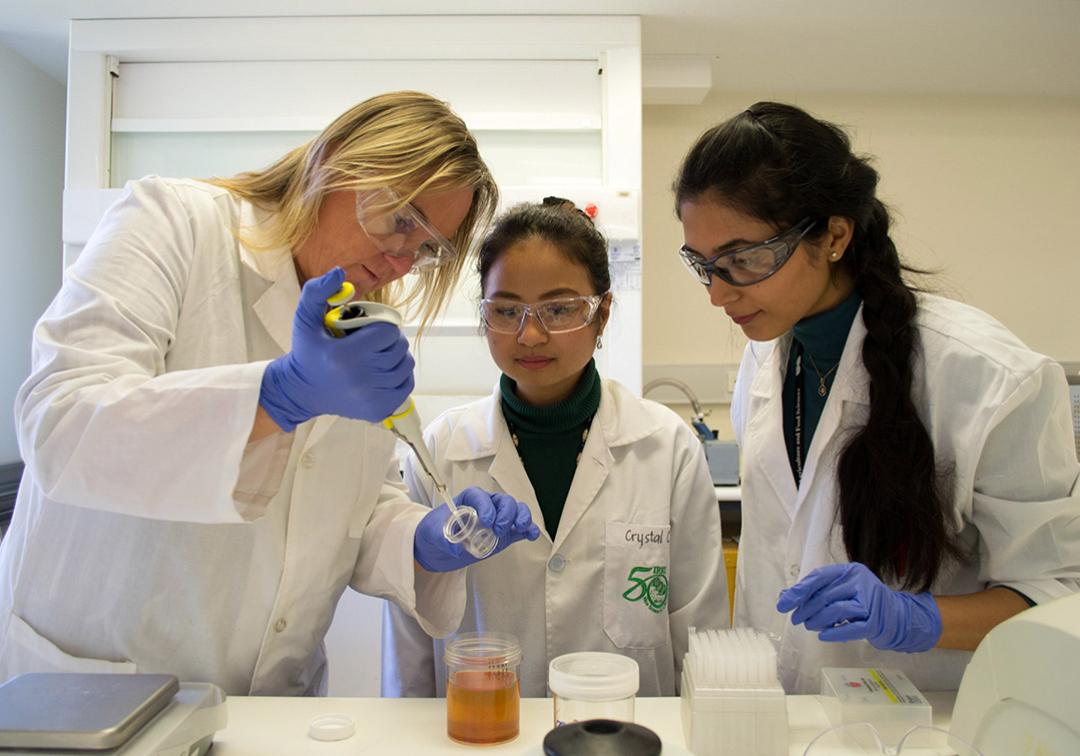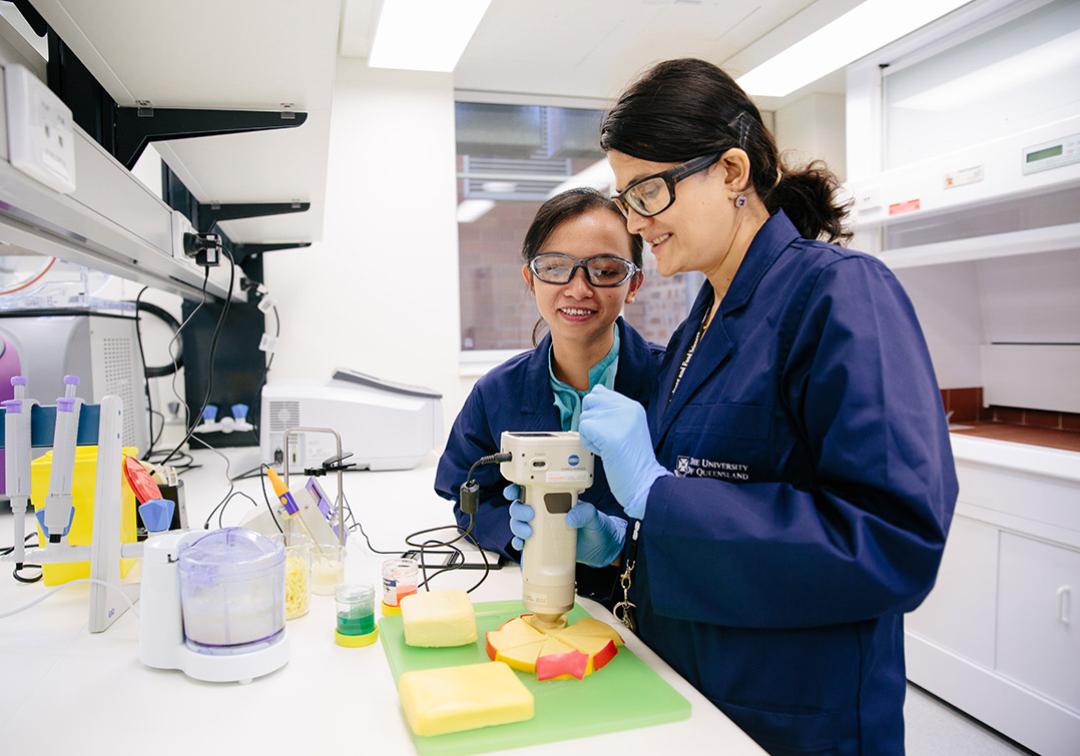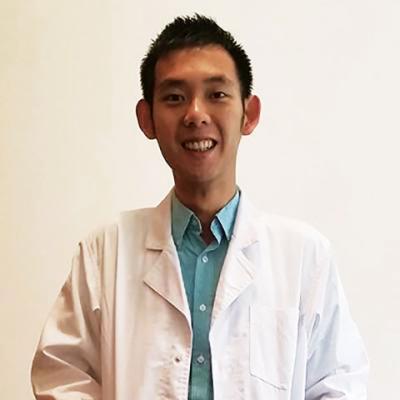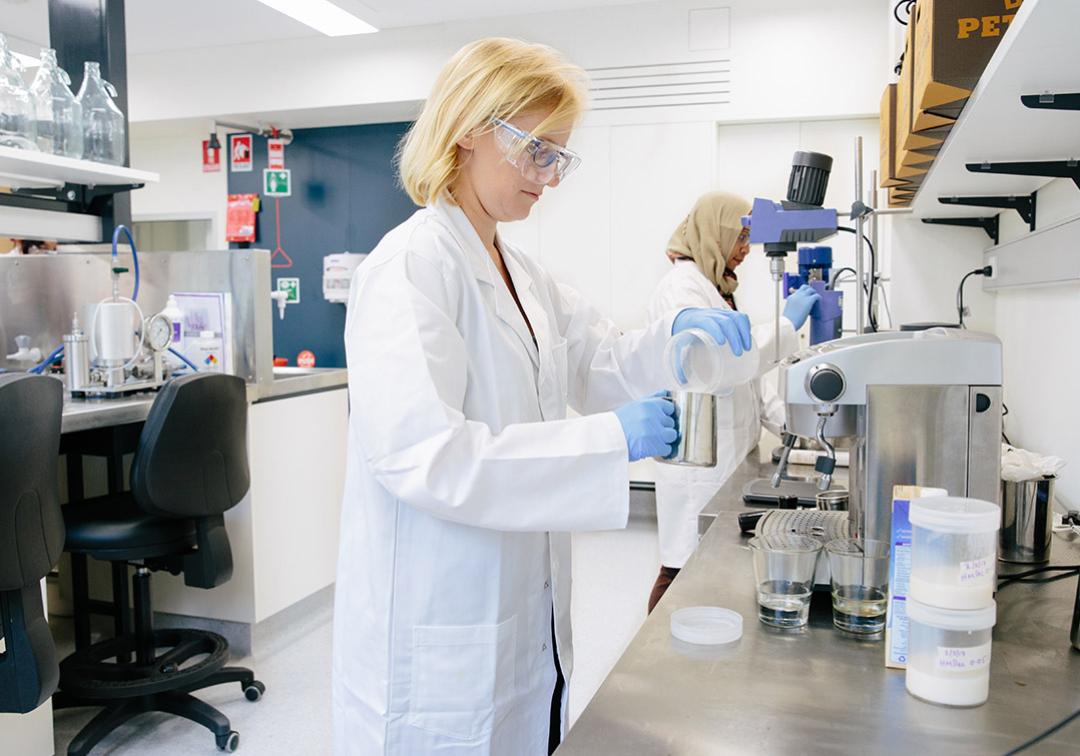
Master of Food Science and Technology Research Extensive
Overview
Build your career in a rapidly advancing industry and be part of the solution to global challenges like food security, nutrition and sustainability.
UQ is a key research provider in food science and technology — our teachers are active researchers who share the latest knowledge in food safety and quality management, food chemistry and microbiology, food processing and new food product development.
The Master of Food Science and Technology Research Extensive program is designed for graduates who wish to increase their technical and laboratory skills in core areas of food science, and to obtain more extended laboratory immersion than is available in the master's degree. The extended program also provides strong preparation for entry into a PhD program.
Through an independent research project, you will increase your technical and research skills working with the University’s researchers and academics or in an industry setting.
You’ll gain access to the Food Science Innovation Precinct – a world-class teaching, research, training and development unit – and have the flexibility to tailor your studies to your interests and career goals, with specialised electives such as business, agriculture and biotechnology.
You can also undertake 400–480 hours of industry experience in your final year, where you'll apply your theoretical knowledge to a food-related workplace situation, acquire a detailed understanding of industry operations, and gain professional skills to enhance your career opportunities.
Program highlights
- Refine your laboratory skills through an independent research project as well as during practicals and research courses, and access the Food Science Innovation Precinct.
- Acquire a detailed understanding of industry operations and gain valuable professional skills.
- Tailor your studies to your interests and career goals with specialised electives.
How you'll learn
Your learning experiences are designed to best suit the learning outcomes of the courses you choose.
- Lectures
- Tutorials
- Work placements
- Research experience
- Laboratory work
What you'll study
At UQ, degrees are called 'programs' and subjects are called 'courses'. Here's a sample of the courses you could study in this program:
- Food Process Engineering I and II
- Food Product Development
- Advanced Functional Foods
- Agricultural Research Methodologies
Career possibilities
Postgraduate study can take you anywhere. Here are some of the careers you could be on your way to:
- University academic
- Food technologist
- Food microbiologist
- Research and development manager
- Process and product development manager
- Quality control manager
- Process and product development manager
- Quality control manager
- Nutritionist
- Food security adviser
Average annual salary range
Food Technologist
seek.com.au
Average annual salary range
Quality Assurance Coordinator
seek.com.au
Next steps after graduation
The food industry is Australia’s largest manufacturing sector and has unmet demand for highly qualified graduates. Our science-based programs prepare you for a career as a food technologist, chemist, microbiologist, production manager, quality or safety control manager, new food product developer, and more.
Events
See all events
29 June
Queensland Biology Winter School, Year 12

1 July
International Baccalaureate Research Skills Program
Stories
See all stories
Careers
What can you do with a food science degree?
4-minute read

Study tips
What will I learn in a food science program at UQ?
5-minute read
Stories
See all stories
Careers
What can you do with a food science degree?
4-minute read

Study tips
What will I learn in a food science program at UQ?
5-minute read
Entry requirements
Entry requirements
To be eligible for entry, you'll need:
- a bachelor's degree (or equivalent) in food science, food technology or food engineering.
- a bachelor's degree (or equivalent) in food science, food technology or food engineering.
Related programs
Depending on your previous qualifications and current goals, you might want to consider
one of these related programs:
English language requirements
IELTS overall 6.5; reading 6; writing 6; speaking 6; listening 6. For other English Language Proficiency Tests and Scores approved for UQ
TOEFL iBT (including Paper Edition) - Overall 87, listening 19, reading 19, writing 21 and speaking 19.
PTE Academic - Overall Score of 64 and 60 in all sub bands.
BE - A minimum overall grade of 4 plus a minimum grade of C in all macro skills.
CES - Overall 176 and 169 in all sub bands.
OET is not accepted.
There are other ways to meet the English language requirements. For some programs, additional conditions apply.
Student visas
International students who are accepted into full-time study in the Master of Food Science and Technology Research Extensive are eligible to apply for an Australian student visa (subclass 500).
There are a number of requirements you must satisfy before a visa is granted, including the Genuine Student (GS) requirement.
Fees and Scholarships
Indicative annual fee
Approximate yearly cost of tuition (16 units). Your fees will vary according to your selected courses and study load. Fees are reviewed each year and may increase.
$9,314
2025
Approximate yearly cost of full-time tuition (16 units). Your fees will vary according to your study load. Fees are reviewed each year and may increase.
AUD $53,760
2025
Government assistance
Financial aid
As an international student, you might be eligible for financial aid – either from your home country, or from the Australian Government.
HECS-HELP
Domestic places in the Master of Food Science and Technology Research Extensive are Commonwealth supported, as long as you meet all Commonwealth supported place eligibility requirements.
This means the cost of your education is shared between you and the Australian Government. Instead of tuition fees, Commonwealth supported students pay what are called student contribution amounts.
If you have a Commonwealth supported place, you may also be eligible for HECS-HELP. This is an Australian Government loan scheme to assist eligible students with the cost of their student contribution amounts.
Centrelink support
The Australian Government offers a number of income-support payments to eligible Australian university students.
Scholarships
You may be eligible for more than 100 scholarships, including:
How to apply
Applying online
All international applications should be submitted to UQ. If you prefer, you can use an approved UQ agent near you.
The program code for the Master of Food Science and Technology Research Extensive is 5753.
Applying online
All domestic applications should be submitted to UQ.
The program code for the Master of Food Science and Technology Research Extensive is 5753.
Important dates
The closing date for this program is:
- To commence study in semester 2 2025 - 5 May 2025 (with offer acceptance due 18 May 2025).
- To commence study in semester 1 - November 30 of the previous year.
Visa processing times vary. Apply and accept your offer as early as you can.
To learn more about UQ dates, including semester start dates, view the Academic Calendar.
Important dates
The closing date for this program is:
- To commence study in Semester 1 - January 31 of the year of commencement.
- To commence study in Semester 2 - June 30 of the year of commencement.
To learn more about UQ dates, including semester start dates, view the Academic Calendar.
Aboriginal and Torres Strait Islander applicants
For support with applying – or if you have any questions about university life – get in touch with our Aboriginal and Torres Strait Islander Studies (ATSIS) Unit.
Explore other programs
Express yourself. And your interest.
They say choosing a degree is hard, which is why we've made it easy. Register your interest and we'll send you everything you need to know about applying to UQ.




